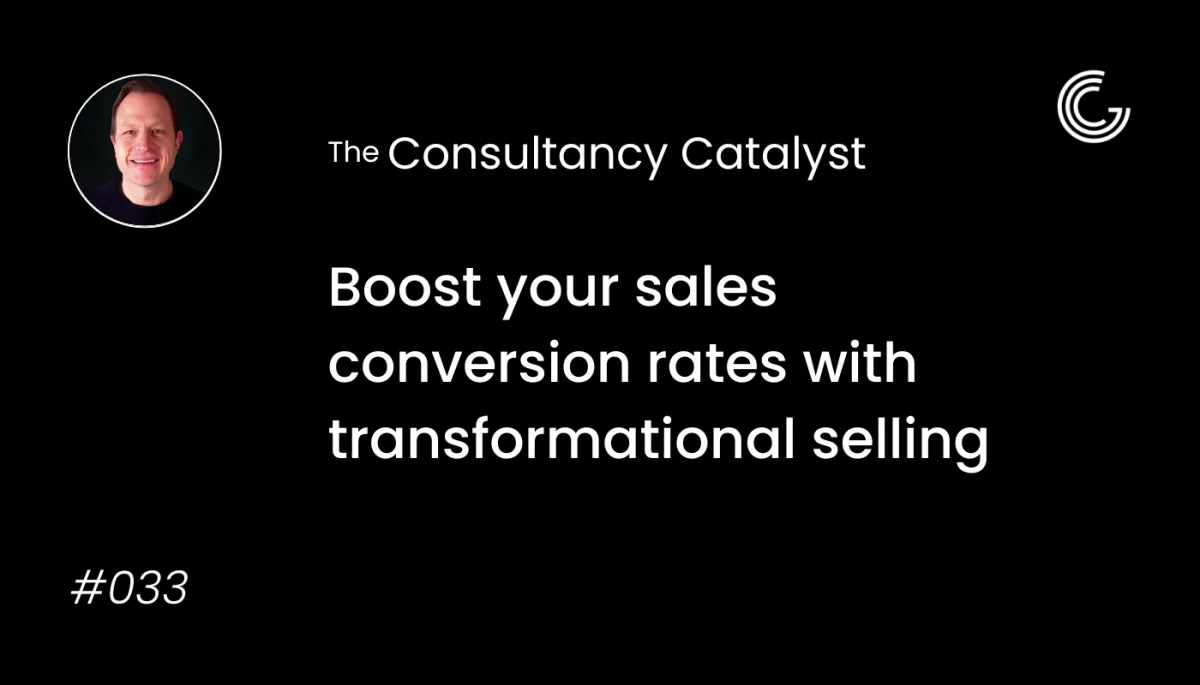The Consultancy Catalyst
Practical tips to build a more valuable, impactful and fulfilling consultancy.
Every Friday morning, you'll get 1 actionable tip to make your consultancy more valuable, impactful and fulfilling in less than 4 minutes.

Boost your sales conversion rates with transformational selling
Clients who invest in your services seek a transformation, whether they realise it or not. This transformation could be solving a problem, achieving a better result, or pursuing continuous improvement. Understanding the transformations you provide is crucial, not just for delivering value but also for increasing your sales conversion rates.
Every purchase is a transformation
Every purchase involves a transformation. Think about the advertising you see, everything revolves around a transformational message:
Cleaning Products: A clean home
Toothpaste: White teeth and fresh breath
Food and Drink: An enjoyable experience
Cars: A fun driving experience
This concept applies to B2B sales as well. However, when marketing B2B, businesses often focus too much on features and benefits, forgetting the emotional transformation. They forget they are selling to people who buy based on emotion as much as logic, whether for personal or business reasons.
You can avoid this by adopting transformational messaging.

The Big Transformation
Most consultancies sell a significant transformation, often delivered over months or years. Understanding that transformation is a natural starting point.
To understand this transformation, consider:
Who are your ideal clients?
What pain are they experiencing?
What mistakes have they made that caused this pain? Often, they won’t be aware of these mistakes until you point them out.
How can you summarise their current situation?
Once you capture their current position, focus on their desired position:
Where do they want to go?
What pleasure is the opposite of their pain?
What must they do differently to avoid their current mistakes?
How can you summarise their destination?
Defining the significant transformation helps you understand the value you provide. For example, I help my clients achieve sustainable, scalable growth they control, transforming them from feast-and-famine cycles due to their reliance on existing clients and referrals.

Selling through a series of transformations
Significant transformations can be overwhelming, so breaking them down into smaller steps helps you sell them more easily.
Start by listing the steps you take your clients through.
Then, apply the same questions to each step as you did for the significant transformation. Ideally, group your steps into three sets or phases, totalling 3, 6, 9, or 12 steps. Determine the transformation for each phase of steps and then identify and start your clients’ on their journey by selling the initial transformation.

A partner in their transformation
Use this initial transformation to establish yourself as their transformation partner.
Clients need preparation for a significant transformation, and the initial transformation tests their readiness. Establish a horizontal relationship with clients, guiding them on an equal footing, as they need to do much of the work to experience the transformation.
To establish and maintain trust, you don’t want them constantly looking up to you or, even worse, allowing them to look down on you.
The goal is for clients to complete their initial transformation with you as their guide, establishing the trust needed for the central transformation.
Building trust as their guide
With trust established, you can guide your clients through the next steps of their transformational journey.
Work with them to create a clear vision of their destination, break it down into milestones, and measure their transformations at each step. Continuously assess their readiness to progress, acting as a responsible guide and maintaining trust.
Using Transformational Selling to increase sales conversions
Understanding and articulating the transformation you provide enhances client satisfaction and boosts your sales conversion rates. Here’s how:
Communicate Transformation: Clearly articulate the transformation clients can expect. Highlight both the emotional and logical benefits.
Leverage Case Studies: Use past successes to showcase transformation, building credibility and trust.
Focus on Initial Wins: Emphasise quick wins that demonstrate value early in the client relationship, encouraging long-term commitment.
Build Long-Term Relationships: Position yourself as a partner in their transformation journey, fostering loyalty and repeat business.
Map out your clients’ Transformational Journey
Understanding the transformation you sell to clients is crucial. Use the outlined steps to build the transformational journey you take clients through.
I'd love to know how you get on with it.
Subscribe to the Newsletter
Join fellow specialist consultancy owners reading The Consultancy Catalyst every Friday for exclusive tips, strategies and resources to make your consultancy move valuable, impactful and fulfilling.
Testimonials

We are so grateful for the amazing photos that [photographer's name] took of our wedding day.
Jane Doe



